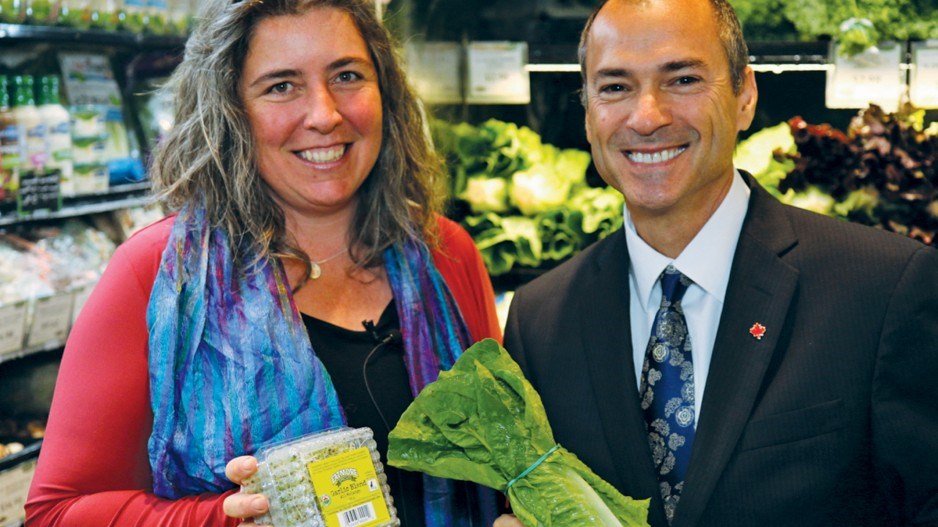When the province announced last fall that it would introduce legislation to regulate and protect the use of the term “organic” by B.C. producers, it touted the increased sales that would result. While many producers railed against the prospect of greater regulation, the legislation allowing the province to regulate who can use the term organic simply assures consumers in B.C. and elsewhere that products designated as organic by one of the province’s certifying bodies is actually what it says it is.
“A lot of people were using the word ‘organic’ but not actually being certified,” said Carmen Wakeling, vice-president of the Pacific Agricultural Certification Society (PACS), co-president of the Certified Organic Associations of BC and a partner in Eat More Sprouts & Greens Ltd. in Courtenay. “Now, the province is aligning with the language that the federal government is using, and the word ‘organic’ is going to be held in association with a certifying program, so it’s going to really clean up the murky waters.”
With organic sales in B.C. topping $1 billion, and increasing by approximately 11 per cent a year nationally, according to the Canadian Organic Trade Association, making sure customers know what they’re getting is important.
B.C. has some of Canada’s biggest concentrations of organic farming, with the Similkameen Valley having claimed bragging rights as “the organic capital of Canada” and the country’s biggest organic carrot and cattle ranches located in the Fraser Canyon near Lillooet.
But the certification system is fragmented, with PACS providing certification across B.C. alongside several local certifying bodies. And no one was policing label claims.
Yet “organic” connotes the best that B.C. farms have to offer, scoring high in public perceptions of agriculture, according to a 2014 report that Strategic Counsel, a Toronto consultancy, prepared for the federal government.
But other terms also scored high, including “green,” “local” and “community gardens” when participants were asked to describe agriculture in positive terms.
But underlying the positive perceptions lurks a desire for control, said Angus McAllister, president of McAllister Opinion Research, which conducted a survey for the Real Estate Foundation of B.C. and Vancouver Foundation regarding local agriculture in 2014.
The survey found that 80 per cent of respondents were concerned about B.C.’s dependence on other countries for food, boosting support for local producers and local crops.
“It used to be that the younger generations were all interested in the world and global and broad horizons, but now in the data I sense that’s more of a threat,” McAllister said. “There’s definite trust in local food in response to a sense of insecurity, generally, and diminishing trust in institutions.”
The desire to know what’s in their food – particularly among gen-xers and millennials – has spurred much of the growth in farm markets and community gardens, where consumers can cultivate relationships with producers and produce itself.
Statistics Canada’s annual survey of households found that 59 per cent of B.C. residents grow their own food, whether in yards, planters, or community gardens. Yards were the favoured place for food production, with Metro Vancouver residents leading the province in the use of community gardens.
Community gardens have even led to a renaissance in local agriculture in places such as Burnaby, where a 14.5-acre community garden established following the reinstatement of agricultural zoning in the Big Bend area in 1972 has been the epicentre for a small-scale agricultural revival. B.C. Ministry of Agriculture staff installed servicing for 372 plots managed by the Burnaby and Region Allotment Gardens Association.
The garden in Burnaby was joined by developments in Richmond, Victoria and elsewhere as part of the province’s push to get more people growing their own vegetables.
The early investment is the cornerstone of agriculture in the Big Bend area, where approximately 319 acres of farmed land generates $11.5 million a year in sales.
“Burnaby’s Big Bend has this long history of agricultural production tied to these small lots,” Jim Wolf, a senior long-range planner for Burnaby, said. “There’s a lot of people seeking out those lands. … We’re actually seeing a higher take-up of agricultural lands for production than we have in the past.”
Marcela Crowe, executive director of the Vancouver Urban Farming Society, said Vancouver is typically a training ground for urban farmers, giving them a taste of what’s possible, but the suburbs is where they can really grow their operations.
To meet the demand, Richmond allows urban farming anywhere within city limits, while Surrey’s agricultural strategy identifies the use of city-owned land as a means to support young farmers and to incubate new farm businesses.




